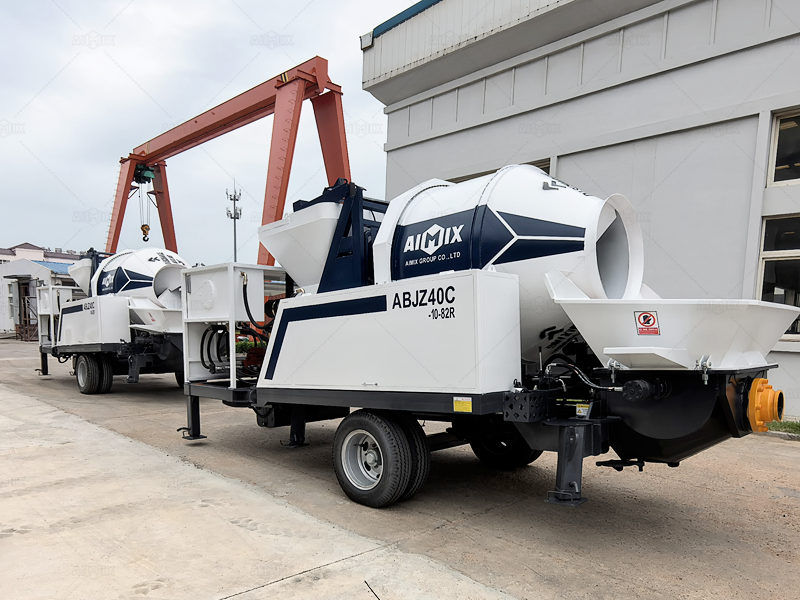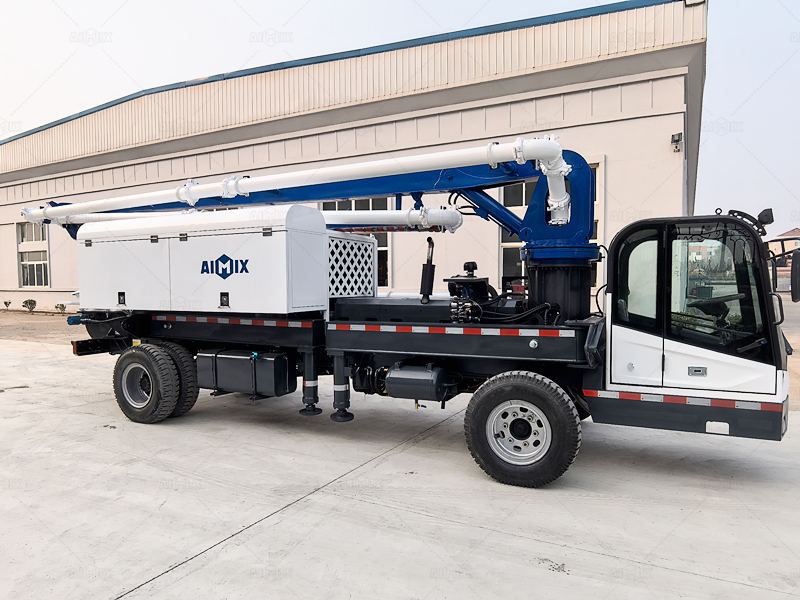How Does Payment Method Influence Concrete Mixer with Pump for Sale Price
- aimixglobal5
- Nov 3, 2025
- 5 min read
When purchasing a concrete mixer with pump for sale, one of the most important aspects that buyers often overlook is how payment methods can significantly influence the final price of the equipment. The concrete pump machine price is not just determined by its production cost, model type, or shipping fees—it can also fluctuate depending on how the buyer chooses to make payment. In the modern construction equipment market, especially in international trade, suppliers offer several payment options such as bank transfers (T/T), letters of credit (L/C), installment plans, and even financing programs. Each of these methods has its own impact on the supplier’s cash flow, risk exposure, and overall pricing strategy. Understanding how these payment terms work and how they affect the final cost will help buyers make smarter purchasing decisions and potentially negotiate better deals on their next concrete mixer with pump for sale.

The Role of Cash Flow and Risk Management in Pricing
Suppliers of concrete mixer with pump for sale must carefully balance cash flow and financial security when offering prices to customers. The payment method directly affects this balance. For example, when a buyer pays 100% in advance, the supplier receives immediate working capital, which can be used to purchase raw materials, schedule production faster, or pay for logistics upfront. Because this arrangement eliminates financial risk for the supplier, they are often willing to offer a discounted concrete pump machine price as a sign of goodwill or incentive for early payment.
However, if the buyer requests to pay in multiple installments—say 30% deposit before production and 70% after delivery—the supplier takes on a higher level of financial risk. The manufacturer must invest in production, labor, and packaging without yet receiving full payment. In this case, the price of the concrete mixer with pump for sale may be slightly higher to compensate for the risk of delayed or incomplete payment. Suppliers often include a small markup to offset the cost of financing or potential non-payment.
Payment by Telegraphic Transfer (T/T) and Its Effect on Price
One of the most common methods used in the international trade of heavy machinery is telegraphic transfer, often abbreviated as T/T. This method usually involves a partial prepayment before production and the remaining balance after shipment or delivery confirmation. When purchasing a concrete mixer with pump for sale via T/T, buyers typically pay 30% to 40% upfront and the rest upon receiving the bill of lading or inspection report.
This payment method provides a fair level of security for both parties: the supplier receives enough funds to begin production, while the buyer retains control over the remaining payment until shipment is verified. However, because the supplier carries some degree of financial risk before receiving the balance, the concrete pump machine price may be slightly higher than if the payment were made in full at the time of order. Some suppliers may charge an additional 1–3% markup to cover currency fluctuation risks or potential payment delays that could affect their cash flow.
Buyers who want to save on costs can negotiate with suppliers by offering a higher deposit percentage in exchange for a discount. For instance, increasing the initial deposit from 30% to 50% can sometimes reduce the concrete pump machine price because it helps the supplier secure raw materials faster and ensures production stability.
Letter of Credit (L/C) and Its Impact on Pricing
Another widely used method in international equipment trading is the Letter of Credit (L/C). This method is often preferred by large construction companies or government contractors when purchasing high-value machinery such as a concrete mixer with pump for sale. An L/C acts as a financial guarantee issued by the buyer’s bank, ensuring that the supplier will receive payment once they meet specific shipping and documentation requirements.
While this payment method provides maximum security for both parties, it also increases administrative and banking costs. The process involves verification fees, document preparation, and bank charges, all of which can add 2% to 5% to the total transaction cost. As a result, suppliers often include these expenses in the concrete pump machine price when offering quotations for L/C payments.
Moreover, the complexity of processing an L/C can lead to longer waiting times for payment, which ties up the supplier’s capital. To offset this delay, manufacturers may slightly raise the price of the equipment. In contrast, buyers who can make quicker payments through simpler methods like T/T or direct bank transfers are often rewarded with lower pricing and faster delivery schedules.
Influence of Financing and Installment Plans
Some suppliers and dealers, especially those serving local markets, offer financing or installment plans to make it easier for contractors to purchase a concrete mixer with pump for sale without a large upfront payment. While this arrangement makes the purchase more accessible to smaller businesses, it almost always increases the total cost of the equipment. The reason is that the supplier or financing institution assumes more financial risk and interest charges are applied over time.
In these cases, the concrete pump machine price includes not only the base cost of the equipment but also an added financing premium that compensates for delayed payments. Depending on the repayment duration, this markup can range between 5% and 15%. Although the buyer pays more in total, the benefit lies in spreading out the cost, maintaining working capital, and beginning construction operations immediately.
When considering installment payments, buyers should carefully review the interest rate and repayment terms. It’s also advisable to compare the total financed amount with the cash purchase price of the concrete mixer with pump for sale to assess whether the flexibility is worth the additional cost.
Currency Exchange and International Payment Considerations
For buyers purchasing concrete mixer with pump for sale from overseas manufacturers, exchange rate fluctuations can have a major effect on the concrete pump machine price. If the buyer’s currency weakens against the supplier’s, the total cost of the purchase can rise unexpectedly by several percentage points. Conversely, a strong local currency can make imported machinery more affordable.
Certain payment methods, such as paying in the supplier’s preferred currency or using forward contracts, can help reduce exchange rate risk. However, these arrangements may involve bank transaction fees or service charges. Suppliers sometimes include a buffer in the quoted concrete pump machine price to account for potential currency volatility. Buyers who can make prompt payments in the supplier’s local currency often enjoy better pricing and faster order processing because it simplifies financial transactions for both sides.
Negotiation Opportunities Based on Payment Method
One of the most practical ways buyers can influence the concrete pump machine price is through negotiation based on their preferred payment method. Offering full payment in advance or a higher deposit can often lead to price reductions or added value such as free spare parts, extended warranty, or discounted shipping. Conversely, if a buyer insists on extended payment terms or delayed settlements, the supplier may include a small premium to cover financial risks.
Clear communication between the buyer and seller is essential during these negotiations. By explaining their financial capabilities and project timelines, buyers can build trust with suppliers, often resulting in mutually beneficial agreements. Some suppliers even reward repeat customers with more flexible payment terms while maintaining competitive pricing for the concrete mixer with pump for sale.
Conclusion
In conclusion, the concrete pump machine price of a concrete mixer with pump for sale is influenced not only by production factors but also by how and when payment is made. Each payment method—whether it’s full prepayment, T/T, L/C, or installment financing—carries different levels of risk, cost, and convenience for both buyers and suppliers. Payment in full often leads to discounts and faster shipment, while delayed or installment-based payments usually include additional charges to cover financial risks. By understanding these dynamics and choosing the most suitable payment method, buyers can optimize their budget, improve cash flow, and establish stronger business relationships with suppliers. Ultimately, effective communication and transparent financial planning are key to securing the best deal for any concrete mixer with pump for sale in today’s competitive construction machinery market.





Comments